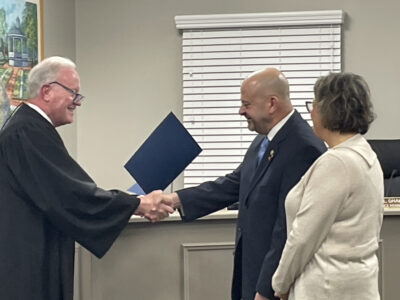A buzzing retirement
Youngstown man tends to honeybees with backyard hives
YOUNGSTOWN — Don Kovach worked for the Air Force for 34 years to make sure aircraft were in the skies.
Today, he has a new type of fleet: He cares for millions of honeybees in his own backyard.
Kovach started his Air Force service in 1975. In 1980, he moved to the Air Force Reserve and in 1985, he became a full-time Civilian Air Force employee. He retired after 34 years of service in aircraft maintenance, civil engineering and supply / tech services, finishing at the 910th Airlift Wing at the Youngstown Air Reserve Station in Vienna.
In 2000, Kovach’s family lived on South Turner Road and had an apple orchard. Understanding the need for pollinators, Kovach got involved with the Columbiana Mahoning County Beekeepers Association and began what is now Kovach’s No. 1 hobby.
“I presently have 22 hives,” he said. “And I need a bigger bee hive.”
Over the past 25 years, Kovach has studied, attended workshops, took school courses and heard from a variety of expert speakers.
“The library has 23 books on beekeeping and I have read them all,” he said.
Each of Kovach’s hives has its own queen. He said the bees even know which hive they belong to and the guard bees can tell if the bee doesn’t belong.
He said bees are highly intelligent. One scout bee will go out to gather nectar and will return to the hive and by using wing flapping and stances, it will tell the other bees where the source of the nectar is.
“The bee can tell other bees how far, in what direction, and the quality of the nectar,” Kovach said. “The other bees will know exactly where to go from that first bee’s communications.”
He said in a hive, each bee has a job to do. Some work in the nursery to care for the eggs and the newborn bees. Some work the hive to prepare the cells for the queen to lay her eggs.
“A queen can lay up to 1,500 eggs per day,” he said. “And she inspects every cell before depositing the egg. That cell has to be perfectly clean.”
He said the field bees are the ones that go out and bring back the pollen to aid in the manufacture of honey. There are also undertaker bees whose task is to remove any dead bees from the hive. Every healthy hive is clean inside because the dead are removed immediately.
The final career for a bee is the position of guard bee. These are the ones who stand at the door and fight to the death to keep intruders out of the hive.
“In a bee’s life, they will change jobs twice,” he said. “They start as a nursery bee, then move to being a field bee, and finally, they serve as a guard bee before they die.”
While it sounds like the bees are capable of running the show by themselves, Kovach spends time doing his share to see the bees continue to grow and stay healthy.
One of the big threats is mites, but Kovach can take care of that. He has an acid chemical that is used to rid a hive of the mites.
“To get a bug off a bug, we have a tool,” he said. “I have a mister I put a diluted acid mix in, then I mist the hive. The chemical goes throughout the hive and gets on everything, including the bees. It doesn’t bother the bees, but it is a poison to the mites.”
He also noted the hives can get too big in regards to bee numbers and that is when it splits. A new queen is born and when she is old enough, will take over the hive. The old queen will leave and take half the bees with her to a new hive. The other half of the hive stay with the new queen and the process starts anew.
Kovach does reap a lot of honey from the hives, but he leaves a lot, too. He said bees need 50 pounds of honey just to get through November.
“Last year, I lost 50% of my hives due to mites and insecticides,” Kovach said.
Losing a hive is tough, but Kovach is among the few who will rescue bee hives from around the county. One recent call involved a honeybee nest in a tree trunk. A tree service cut the tree down and found the nest. The company called Kovach and he responded immediately.
“I have an entire retrieval kit in my vehicle,” he said. “I am ready to roll when I get the call.”
Many of the hives in his back yard have come from calls.
He fenced in the hives and displays his Ohio beekeepers permit. He said all beekeepers must be licensed in this state. The hives can also be inspected by the state each year. The inspections are important when honey is being harvested for consumption.
Kovach also enjoys teaching others and as a member of the Columbiana Mahoning BeeKeepers Association, he helps with the annual Canfield Fair display.
Kovach sells enough honey to pay for the lumber and supplies for the hives. In essence, he said the bees are paying for their own upkeep. He also collects the wax, which can be used to make candles, hand cream, soaps and lip balm.



